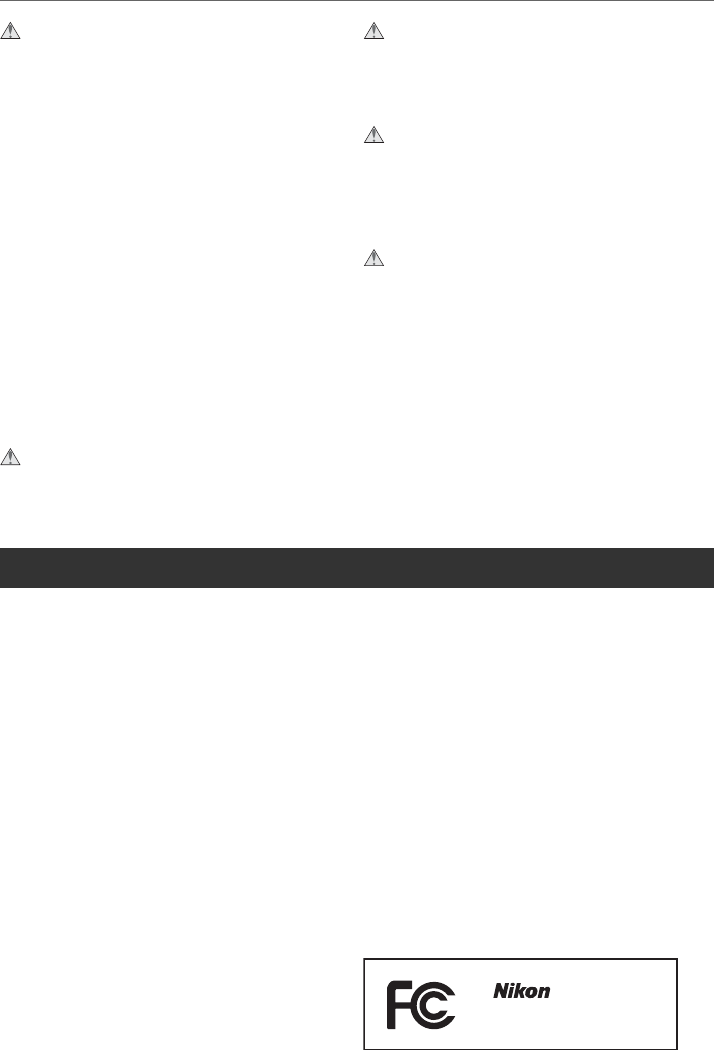
iii
For Your Safety/Notices
Notices
Observe proper precautions when
handling the quick charger
• Keep dry. Failure to observe this precaution
could result in fire or electric shock.
• Dust on or near the metal parts of the plug
should be removed with a dry cloth.
Continued use could result in fire.
• Do not handle the power cable or go near the
charger during lightning storms. Failure to
observe this precaution could result in electric
shock.
• Do not damage, modify, or forcibly tug or
bend the power cable. Do not place it under
heavy objects or expose it to heat or flame.
Should the insulation be damaged and the
wires become exposed, take the power cable
to a Nikon-authorized service representative
for inspection. Failure to observe this
precaution could result in fire or electric shock.
• Do not handle the plug or charger with wet
hands. Failure to observe this precaution
could result in electric shock.
Use appropriate cables
When connecting cables to the input and
output jacks, use only the cables provided or
sold by Nikon for the purpose to maintain
compliance with product regulations.
CD-ROMs
CD-ROMs containing software or manuals
should not be played back on audio CD
equipment. Playing CD-ROMs on an audio CD
player could cause hearing loss or damage the
equipment.
Observe caution when using the flash
Do not operate the flash with the flash window
touching a person or object. Failure to observe
this precaution could result in burns or fire.
Using the flash close to the subject’s eyes could
cause temporary visual impairment. Particular
care should be observed when photographing
infants, when the flash should be no less than
one meter (39in.) from the subject.
Avoid contact with liquid crystal
Should the monitor break, care should be taken to avoid injury due to broken glass and to prevent the
liquid crystal from the monitor touching the skin or entering the eyes or mouth.
• No part of the manuals included with this product
may be reproduced, transmitted, transcribed,
stored in a retrieval system, or translated into any
language in any form, by any means, without
Nikon’s prior written permission.
• Nikon reserves the right to change the
specifications of the hardware and software
described in these manuals at any time and
without prior notice.
• Nikon will not be held liable for any damages
resulting from the use of this product.
• While every effort has been made to ensure that
the information in these manuals is accurate and
complete, we would appreciate it were you to
bring any errors or omissions to the attention of
the Nikon representative in your area (address
provided separately).
Notices for Customers in the U.S.A.
Federal Communications Commission (FCC) Radio Frequency Interference Statement
This equipment has been tested and found to comply
with the limits for a Class B digital device, pursuant to
Part 15 of the FCC rules. These limits are designed to
provide reasonable protection against harmful
interference in a residential installation. This equipment
generates, uses, and can radiate radio frequency energy
and, if not installed and used in accordance with the
instructions, may cause harmful interference to radio
communications. However, there is no guarantee that
interference will not occur in a particular installation. If
this equipment does cause harmful interference to
radio or television reception, which can be determined
by turning the equipment off and on, the user is
encouraged to try to correct the interference by one or
more of the following measures:
• Reorient or relocate the receiving antenna.
• Increase the separation between the equipment and
receiver.
• Connect the equipment into an outlet on a circuit
different from that to which the receiver is connected.
• Consult the dealer or an experienced radio/television
technician for help.
D60


















